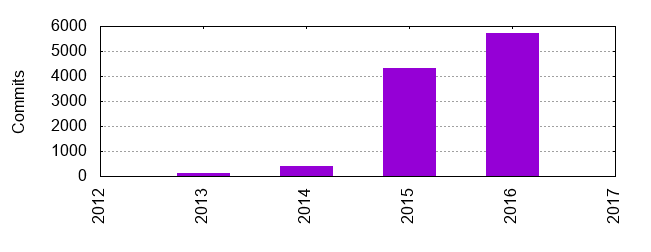
Configuration management tools have recently gained a lot of popularity. At trivago we use SaltStack to automate our infrastructure. As the complexity of configuration files and formulas is increasing, we need a fast, reliable way to test our changes.
In this post we explain how you can start building your own test setup.
How it began
In January 2015 we started using salt from SaltStack as configuration management tool for our infrastructure. In the beginning we focused on our web-server provisioning because we had the biggest amount of servers in this area with different setups for applications like our Hotel Search, Hotel Manager or other services.
After a couple of months, we also moved our development environments away from Chef to salt. Our goal was to use the same technology stack to provision our development- as we do for our production-environment and hence provide developers with a more production-like environment.
By now we provision most of our infrastructure with salt and it became one of our most important tools in the IT operation and software engineering departments. That also means that our internal salt formula repository grew and more and more contributors create pull requests on a daily basis.
Lines of code written for SaltStack (until September 2016)
| File type | Files | Blank | Comment | Code |
|---|---|---|---|---|
| salt (.sls) | 909 | 3272 | 1750 | 23999 |
| Bourne Shell | 139 | 1480 | 1705 | 5382 |
| YAML | 64 | 435 | 1702 | 2257 |
| PHP | 55 | 1015 | 1248 | 5514 |
| Python | 33 | 1002 | 717 | 3708 |
| XML | 23 | 238 | 533 | 1395 |
| INI | 23 | 563 | 1655 | 696 |
| Bourne Again Shell | 20 | 408 | 253 | 2292 |
| Perl | 17 | 984 | 1134 | 6621 |
The intention
Despite using pull requests for all changes and the two-man rule it has happened quite often that our salt master branch (the single source of truth for our internal configuration management) was broken.
Of course: Without any automated tests it’s hard to see every YAML issue and not to mention logical changes with some edge case conditions.
But it is even harder to recognize quickly that only some of your formulas are broken on some machines!
After hundreds of pull requests we found that our issues with salt provisioning fall into the following categories:
- YAML syntax
- Wrong top file definitions / conditions
- Jinja issues in template files
- Networking related issues (availability of resources)
- Issues regarding the order in which states are executed
- Logical changes (removing a required service)
But how you can you detect all of these issue types on every pull request? Manual checkouts and real state executions for every feature branch / pull request?
Of course that’s not really feasible. Otherwise the maintainer will stop with their daily business or the pull requests will queue up until the repository will lose the maintainability.
The first step
At some point you have to start doing something – and every small step is better than nothing. So let’s check salt itself offers in terms of testing:
Salt.modules.state.show_highstate
Retrieve the highstate data from the salt master and display it
SaltStack provides a state module named show_highstate. If executed, salt will render the highstate data but not execute it.
The big benefit: You don’t need a real target server to execute the state – You can easily simulate a server with a container solution and only handle the result.
So far, so good - Let’s see what possibilities salt-call offers:
# salt-call -h
Usage: salt-call [options] <function> [arguments]
Options:
[...]
--retcode-passthrough
Exit with the salt call retcode and not the salt
binary retcode.
[...]
Output Options:
Configure your preferred output format.
--out=OUTPUT, --output=OUTPUT
Print the output from the 'salt-call' command using
the specified outputter. The builtins are 'key',
'yaml', 'overstatestage', 'highstate', 'progress',
'pprint', 'txt', 'newline_values_only', 'raw',
'virt_query', 'compact', 'json', 'nested', 'quiet',
'no_return'.
[...]The global --retcode-passthrough option from salt can also help us to handle the result and the --out=OUTPUT parameter is very useful to wrap the execution with tools or scripts later on.
But what can we detect with this call? Let’s try it out …
First we provide some states:
# `states/dummy/foo.sls` foo_directory: file.directory: - name: /foo# `states/dummy/bar.sls` bar_user_group: group.present: - name: fooBar - gid: 5001 bar_user: user.present: - name: fooBar - fullname: Foo bar - gid: 5001 - require: - group: bar_user_groupSecond we declare them in the
states/top.slsfor a highstate call and test the call:# `states/top.sls` base: 'roles:blog.dummy': - match: grain - dummy.foo - dummy.barNow we check what we get from salt:
salt-call state.show_highstate --retcode-passthroughlocal: ---------- bar_user: ---------- __env__: base __sls__: dummy.bar user: |_ ---------- name: fooBar |_ ---------- fullname: Foo bar |_ ---------- gid: 5001 |_ ---------- require: |_ ---------- group: bar_user_group - present |_ ---------- order: 10002 bar_user_group: ---------- __env__: base __sls__: dummy.bar group: |_ ---------- name: fooBar |_ ---------- gid: 5001 - present |_ ---------- order: 10001 foo_directory: ---------- __env__: base __sls__: dummy.foo file: |_ ---------- name: /foo - directory |_ ---------- order: 10000
Alright, and now let’s test some issues and see what we can detect by executing show_highstate:
YAML syntax issues:
salt-call state.show_highstate --retcode-passthrough [CRITICAL] Rendering SLS 'base:dummy.foo' failed: mapping values are not allowed here; line 3 --- foo_directory: file.directory - name: /foo <====================== --- local: - Rendering SLS 'base:dummy.foo' failed: mapping values are not allowed here; line 3 --- foo_directory: file.directory - name: /foo <====================== --- echo $? 1Wrong top file definitions / conditions
# top file change: # 'roles:blog.dummy': # - match: grainX # - dummy.foo # - dummy.bar salt-call state.show_highstate --retcode-passthrough [ERROR ] Attempting to match with unknown matcher: grainX local: ---------- echo $? 2# top file change: # 'roles:blog.dummy': # - dummy.foo # - dummy.bar salt-call state.show_highstate --retcode-passthrough local: ---------- echo $? 2# top file change: # 'roles:blog.dummy': # - match: grain # - dummy.foo # - dummy.bar salt-call state.show_highstate --retcode-passthrough [ERROR ] Template was specified incorrectly: False local: - "No matching sls found for 'dummy.foo - dummy.bar' in env 'base'" echo $? 1
Nice – we are able to detect invalid YAML syntax and various top file definition issues with a simple salt-call. The only requirements are the states, a salt installation, and a running salt-minion config.
So now you might be thinking “uh - that sounds easy” and you are right - it really is.
Get ready to test
We also started with this simple check. To run these checks we created a Debian based Docker container with a salt installation. We use the Docker volumes to mount the following directories / files:
- A valid grain file mounted to
/etc/salt/grains - A valid masterless minion config mounted to
/etc/salt/minion - Our salt formula repository
Here is an example Dockerfile:
# Dockerfile
FROM debian:jessie
# see https://docs.saltstack.com/en/latest/topics/installation/debian.html
RUN echo 'deb http://httpredir.debian.org/debian jessie-backports main' >> /etc/apt/sources.list \
&& echo 'deb http://httpredir.debian.org/debian stretch main' >> /etc/apt/sources.list \
&& apt-get update \
&& apt-get install --no-install-recommends -y python-zmq python-tornado/jessie-backports salt-common/stretch \
&& apt-get install --no-install-recommends -y salt-minion
&& rm -rf /var/lib/apt/lists/*# build docker container
docker build -t local/example .
# execute state.show_highstate
docker run \
-v /path/to/your/local/saltstack:/saltstack \
-v /path/to/your/local/saltstack/tests/grains:/etc/salt/grains \
-v /path/to/your/local/saltstack/tests/minion:/etc/salt/minion \
local/example salt-call state.show_highstateCI tools like Jenkins, Concourse or Travis CI have native/plugin support for Docker containers. Because of that it’s usually easy to integrate these kind of tests into your existing testing infrastructure in a small amount of time.
We did that with web hooks for every commit, but it’s also possible to use a time scheduling- or a pull- based approach against the master branch.
Even if you support several operating systems it’s possible to test them with a single docker container. You are able to simulate other operating systems (like FreeBSD or Windows Server) because we don’t actually execute real states.
In our case we set the salt grain for the os-family explicitly in our grain file:
# /etc/salt/grains
roles:
- foo
- bar
os_family: FreeBSD # pin os_familyThe tip of the iceberg
”What about the rest of the possible issues mentioned in the beginning” you might ask:
As I already mentioned, this is only the beginning of testing your salt formulas. With this guide we are now able to detect nearly all syntactical issues. To detect the other issue types like jinja errors, network related problems or logical changes we need a kind of integration test for all available highstate definitions.
This topic is out of scope for now but I will provide a separate blog post where I explain how we realized integration testing later on.
In the meantime have fun playing around with your first test suite and enjoy the feeling that not every small change needs a manual test execution.



Follow us on